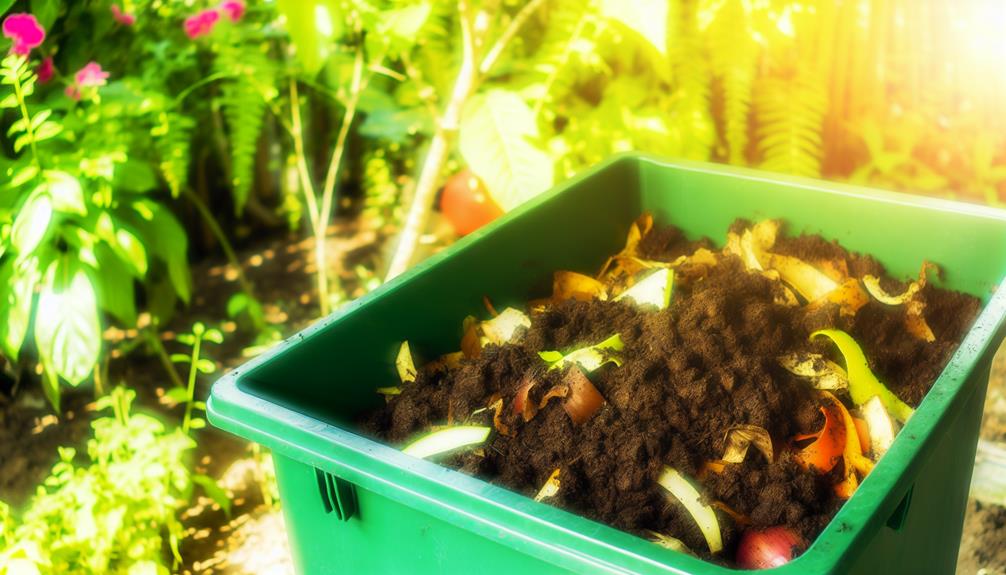

You can definitely compost barbecue sauce, but you’ve got to manage it right for a healthy compost pile. Since barbecue sauce has tomatoes, vinegar, sweeteners, and spices, it offers nutrients and moisture, speeding up decomposition. However, watch out for high sugar and salt—they can attract pests and harm beneficial microorganisms.
Mix it with dry materials like leaves to balance moisture, especially since fats and oils can slow down the process. Keep an eye on the moisture level, aiming for the feel of a wrung-out sponge. By managing these elements, you’ll help your compost thrive and avoid common pitfalls. Discover more tips next!
A typical barbecue sauce’s ingredients usually include tomatoes, vinegar, sweeteners, and various spices. You’ll find that tomatoes form the base, giving it that rich, tangy flavor we all love.
Vinegar adds a zesty kick, balancing the sauce’s sweetness. Sweeteners—often brown sugar or molasses—provide depth and that sticky, delightful texture.
The spices, which can range from garlic and onion powder to smoked paprika, create the unique flavor profiles that make each sauce special. Understanding these ingredients helps you connect with the culinary tradition and community around barbecue.
This shared knowledge fosters a sense of belonging, whether you’re at a cookout with friends or just experimenting in your kitchen. So, let’s dive into how these ingredients affect composting!
Also Read: Can You Compost Azuki Beans?
Understanding how barbecue sauce ingredients decompose is essential for maintaining a healthy compost pile. Barbecue sauce often contains elements like tomatoes, vinegar, and spices, which decompose at different rates.
When you add barbecue sauce to your compost, you’re introducing a mix of organic and acidic components. These can help speed up the decomposition process by providing nutrients and moisture that microbes love. However, balance is key.
Too much sauce could create an overly wet environment, potentially leading to mold or unpleasant odors. By mixing barbecue sauce with dry materials like leaves or straw, you’ll create a balanced compost pile that decomposes efficiently.
While balancing moisture and acidity is important, you should also pay attention to the sugar and salt content in barbecue sauce when adding it to your compost pile.

High sugar levels can attract unwanted pests, making your compost less effective. Salt, on the other hand, can be detrimental to soil health, harming beneficial microorganisms essential for decomposition.
To maintain a healthy compost, use barbecue sauce sparingly or dilute it with water before adding. This way, you can avoid creating an environment that’s too harsh for your compost’s ecosystem.
When composting barbecue sauce, you need to manage moisture levels carefully to guarantee a healthy compost pile. Balancing the liquid ingredients is essential because too much moisture can lead to a soggy mess, while too little can hinder decomposition.
Aim for a texture that feels like a wrung-out sponge, adding dry materials like leaves or straw if it gets too wet.
To create the perfect balance of moisture in your barbecue sauce compost, monitor the liquid ingredients closely to avoid making the mixture too soggy or too dry. Pay attention to the consistency of your compost pile. If it’s too wet, it can become a breeding ground for pests and bad odors.
Balance is key—add dry materials, like leaves or cardboard, to absorb excess moisture. On the flip side, if your compost appears too dry, a splash of water or more sauce can help. By finding that sweet spot, you’ll foster a thriving environment for decomposition.
How can you prevent your compost from becoming too wet and unmanageable?
First, balance your green and brown materials. Greens, like your barbecue sauce, add moisture, while browns, like dry leaves or shredded paper, absorb it. Mixing these together helps maintain the right moisture level.
Turn your compost regularly to encourage airflow and prevent sogginess. If your pile feels too wet, add more browns and mix thoroughly.
Consider using a compost bin with drainage holes to let excess liquid escape. Be mindful of the weather, as rain can add extra moisture. Cover your compost during heavy rainfall.
Also Read: Can You Compost Cotton Balls? The Shocking Truth Revealed!
When composting barbecue sauce, fats and oils can affect how quickly your pile breaks down and manage its liquid content.

You’ll need to be mindful because too much fat can slow decomposition and create an unpleasant smell.
Fats and oils in barbecue sauce can greatly impede the composting process by creating anaerobic conditions. These conditions slow down decomposition and can produce unpleasant odors, making your compost pile less effective.
To understand why fats and oils are problematic, consider these points:
To manage the liquid content in your compost pile, especially fats and oils, start by minimizing the amount added. Fats and oils can slow down decomposition and attract pests.
Instead, scrape off excess sauce before composting barbecue scraps. If some sauce still gets in, balance it by adding more dry materials like leaves, cardboard, or straw. This helps absorb the liquid and keeps your pile aerated.
Remember, too much moisture can lead to an unpleasant, smelly mess, so turning your compost regularly is key. By controlling these elements, you’ll maintain a healthy compost environment, turning your waste into rich, fertile soil.
Join others in this eco-friendly practice and watch your garden thrive!
Make sure you remove any large chunks or pieces from the barbecue sauce before adding it to your compost pile. This step guarantees a smoother composting process and prevents any potential issues.
Here are some tips to help you:
Also Read: Can You Compost Acorns?
If composting barbecue sauce isn’t feasible, consider some alternative disposal methods to manage your waste responsibly. You can always donate unopened bottles to food banks, ensuring they benefit those in need.
If the sauce is already opened and no longer usable, you can dispose of it in the trash, but make sure to rinse out the container and recycle it. Additionally, you might explore creative reuse, like turning the sauce into a marinade or cooking base.
Here’s a quick guide to help you:
| Method | Description | Benefits |
|---|---|---|
| Donation | Give to food banks or shelters | Helps those in need |
| Trash & Recycle | Rinse and recycle the container | Reduces landfill waste |
| Creative Reuse | Use as a marinade or cooking base | Minimizes waste |
| Animal Feed | Check if safe for pets (small amounts) | Reduces waste |
| Community Gardens | Ask if they can use it for compost | Supports local efforts |
You can compost barbecue sauce, but you need to be cautious. The high sugar and salt content, along with fats and oils, can disrupt your compost pile.
To manage moisture levels, balance the sauce with dry materials like leaves or straw. Stirring the pile helps prevent clumping and guarantees even decomposition.
If you’re uncertain, consider alternative disposal methods. By following these tips, you can effectively compost barbecue sauce and contribute to a healthier garden.

Don't let aphids, slugs, and caterpillars ruin another plant. Take back control with simple, natural methods that actually work.